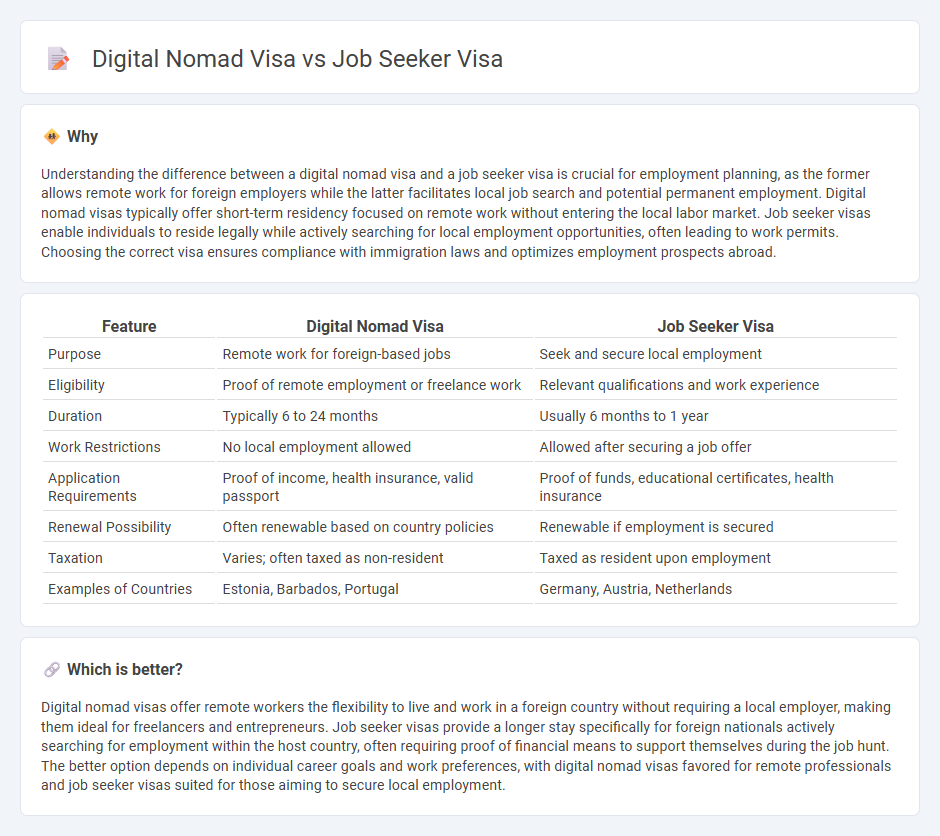
Digital nomad visas cater to remote workers seeking flexibility to live and work abroad without local employment, whereas job seeker visas allow individuals to explore in-country professional opportunities before securing a job. Key distinctions include eligibility criteria, duration of stay, and work restrictions, with digital nomad visas often emphasizing self-employment and remote income sources. Explore detailed comparisons to determine which visa aligns with your employment goals and international mobility plans.
Why it is important
Understanding the difference between a digital nomad visa and a job seeker visa is crucial for employment planning, as the former allows remote work for foreign employers while the latter facilitates local job search and potential permanent employment. Digital nomad visas typically offer short-term residency focused on remote work without entering the local labor market. Job seeker visas enable individuals to reside legally while actively searching for local employment opportunities, often leading to work permits. Choosing the correct visa ensures compliance with immigration laws and optimizes employment prospects abroad.
Comparison Table
| Feature | Digital Nomad Visa | Job Seeker Visa |
|---|---|---|
| Purpose | Remote work for foreign-based jobs | Seek and secure local employment |
| Eligibility | Proof of remote employment or freelance work | Relevant qualifications and work experience |
| Duration | Typically 6 to 24 months | Usually 6 months to 1 year |
| Work Restrictions | No local employment allowed | Allowed after securing a job offer |
| Application Requirements | Proof of income, health insurance, valid passport | Proof of funds, educational certificates, health insurance |
| Renewal Possibility | Often renewable based on country policies | Renewable if employment is secured |
| Taxation | Varies; often taxed as non-resident | Taxed as resident upon employment |
| Examples of Countries | Estonia, Barbados, Portugal | Germany, Austria, Netherlands |
Which is better?
Digital nomad visas offer remote workers the flexibility to live and work in a foreign country without requiring a local employer, making them ideal for freelancers and entrepreneurs. Job seeker visas provide a longer stay specifically for foreign nationals actively searching for employment within the host country, often requiring proof of financial means to support themselves during the job hunt. The better option depends on individual career goals and work preferences, with digital nomad visas favored for remote professionals and job seeker visas suited for those aiming to secure local employment.
Connection
Digital nomad visas and job seeker visas are connected by their role in facilitating international employment opportunities for individuals seeking flexible work arrangements or permanent employment abroad. Digital nomad visas cater to remote workers who require temporary residence without local labor market integration, while job seeker visas allow individuals to enter a country to search for traditional employment and secure work permits. Both visa types support global talent mobility, enabling professionals to contribute economically while exploring diverse job markets.
Key Terms
Work Authorization
Job seeker visa grants individuals temporary permission to stay in a country while actively searching for employment, often without immediate work authorization. Digital nomad visa explicitly provides remote workers with legal permission to live and work abroad for a certain period, typically linked to self-employed or freelance status. Explore more to understand which visa aligns best with your professional goals and work authorization needs.
Remote Work
The Job Seeker Visa enables professionals to enter a country and actively search for employment, often requiring proof of qualifications and a clear intention to work locally, while the Digital Nomad Visa targets remote workers who maintain employment with foreign companies and seek legal residency without engaging in local job markets. Remote work under a Digital Nomad Visa typically offers greater flexibility in travel and employment across global borders, as it does not necessitate local employer sponsorship or job commitment. Explore detailed requirements and benefits of each visa to determine the best option for your remote work lifestyle.
Residency Requirements
Job seeker visas typically require applicants to demonstrate sufficient funds to support themselves during the job search period, proof of accommodation, and valid health insurance, while often granting temporary residency for six months to one year. Digital nomad visas generally mandate proof of remote employment or freelance work with a minimum income threshold, valid health insurance, and sometimes accommodation details, allowing residency that can extend from six months to two years with renewals possible. Explore comprehensive comparisons of residency requirements to determine which visa best suits your international living plans.
Source and External Links
Job Seeker Visa - Necessary Documentation - National Visas - Vistos - Portugal's job seeker visa allows entry for 120 days (renewable by 60 days) for job searching and permits work until the visa expires or a residence permit is granted.
Germany Job Seeker Visa - Requirements & Application - Germany's job seeker visa is a six-month long-stay national visa permitting qualified professionals to find work and later apply for a residence permit, with eligibility criteria including recognized qualifications and sufficient financial resources.
Countries that Offer Job Seeker Visas - VisaGuide.World - The job seeker visa allows foreign nationals to enter a country and seek employment for a limited period, with Germany being a prominent example offering six months for job search and work activities.
 dowidth.com
dowidth.com